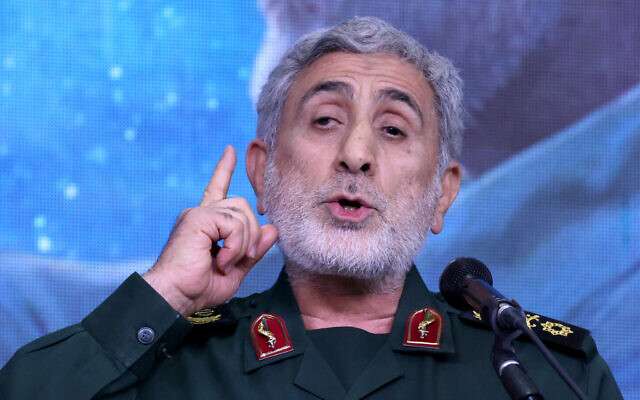
The top commander of Iran’s Quds Force, Esmail Qaani, is in “good health,” the force’s deputy commander Iraj Masjedi said on Monday, after Iranian security sources told Reuters he had been out of contact since strikes on Beirut last week.
“He is in good health and is carrying out his activities. Some ask us to issue a statement… there is no need for this,” Masjedi was quoted as saying by state media in reference to Qaani.
One of the officials speaking to Reuters said Qaani was in a southern suburb of Beirut known as Dahiyeh during a strike last week that was reported to have targeted senior Hezbollah official Hashem Safieddine, who had been widely expected to be the next Hezbollah chief after Hassan Nasrallah’s assassination.
The official said Qaani was not meeting Safieddine.
Israel has been hitting multiple targets in Dahiyeh as it battles the Iran-backed Lebanese terror group Hezbollah, after a year of intensifying cross-border attacks against the Jewish state.
Get The Times of Israel’s Daily Editionby email and never miss our top stories
Tehran named Qaani the head of the Quds Force, the Islamic Revolutionary Guards Corps’ overseas military intelligence service, after the United States assassinated his powerful predecessor Qassem Soleimani in a drone strike in Baghdad in 2020. The IRGC is a US-designated terrorist organization.
Senior Hezbollah official Hashem Safieddine (C) attends the funeral ceremony of slain top commander Fuad Shukr in Beirut’s southern suburbs on August 1, 2024. (Khaled Desouki/AFP)
The Quds Force spearheads dealings with Iran’s proxy groups across the Middle East, which include Hezbollah in Lebanon, Hamas in Gaza and the Houthi rebels in Yemen.
The confrontation between Israel and Iran has become more direct in recent months. Iran launched some 200 ballistic missiles at Israel last Tuesday, its second-ever direct attack, following its first one in April.
While Iran hailed the attack as a “great success” and the IDF has confirmed that two bases were hit in the attack, the army also said that none of the Air Force’s operational capabilities were harmed in any way. One Palestinian was killed by falling shrapnel in the West Bank.
Israel has yet to retaliate for the attack but has vowed a significant response as it mulls the potential targets it would hit.




